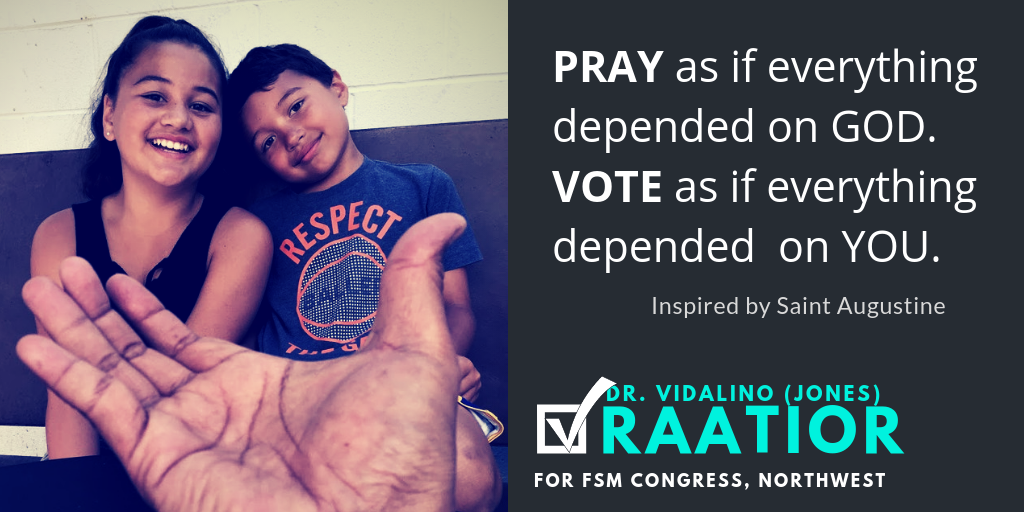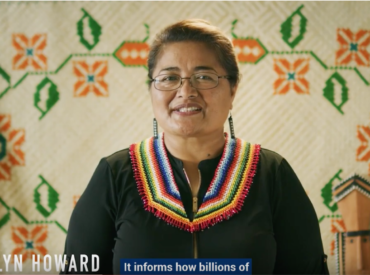As we approach the March 5, 2019 FSM and Chuuk State elections, we need to check our hearts and intentions before we choose our leaders for the next two years particularly as we approach 2023. Is it our intention to vote for candidates because we have personally benefited or want only our family members to benefit from public funds? Or do we want leaders who will challenge the very core of pachification which has kept our beloved state and nation from the progress we ALL deserve? Let us pray for leaders who will help all and vote our prayer.
Ke Pach Ke Tento (Pachification)
The phrase “Ke Pach Ke Tento” was coined in the late 80’s to describe the unfair distribution of tents and cash from the US Federal Emergency Management Agency (FEMA) following a devastating super typhoon in Chuuk. Instead of following FEMA-sanctioned distribution procedures based on needs, the local Chuukese FEMA staff gave tents and cash to individuals based on favoritism, nepotism, etc. Those lucky enough to know someone on the FEMA local staff get issued a tent. Never mind that a family left homeless by the typhoon really needed the shelter…no pach no tent.
Today, pachification is alive and well in our beloved Chuuk. It continues to hinder our beloved Chuuk from operating at its full potential. Let’s look at some of the proverbial pachification practices in Chuuk today that frustrates Chuukese citizens to leave Chuuk for the US. These practices also discourage the Chuukese citizens in the US from returning to Chuuk with college credentials or work experience lest they are victimized by these harsh realities of pachification.
Ke Pach Ke Angang (jobs): Since 1986, Chuuk has experienced a steady flow of Chuukese citizens looking for employment opportunities in Guam, Hawaii, and elsewhere. The only viable jobs are in the Chuuk State government and the few private sectors. But who gets considered for a job is determined by department directors and the hiring controlled by the all-powerful department directors…pachification determines who gets hired.
Ke Pach Ke Refer (medical referrals): Staying or returning to Chuku is literally a matter of life or death. Because of limited budget very few critically ill Chuukese get selected to be medically evacuated to the Philippines for specialized health care. Only those who pach get the referrals paid for by the health services. All others die at the Chuuk State Hospital or from overdose on the all-purpose solution for all Chuukese illness: safean paiking
Ke Pach Ke Win (elections): A proponent of secession Frank Cholymay posted on Facebook recently that “Government is a business.” While I disagree with this displaced notion of public service, I would venture to believe that many (not all) Chuukese citizens who decide to run for state or national offices do it to profit financially, gain social status, and to improve their own business ventures.
Ke Pach Ke Sai (business travels): The most traveled Chuukese citizens to date are the politicians and other high ranking, highly paid government employees who collect per diems, travel allowances even when they stay with relatives during their “government-related business” trips (aka campaign). Most of the average government employee never experience these travel benefits unless, well, they have have earned enough pachification leaves like the overused sick leaves.
Ke Pach Ke Train (professional developments): Why is it that most of the professional training conferences outside of Chuuk seem to be always attended by the department heads and not those who would benefit the most from them? Who ensures that a department head who participate in a technical training or conference actually leads professional development programs for their employees upon returning from their travels? The teachers and principals who need the most opportunities for professional development to aid them in the classrooms and in running our public schools are the most untrained due to this pachification problem.
Ke Pach Ke Project (public projects): It is a common practice now among many Chuukese elected officials especially our congressmen who have the largest “discretionary funds” for social and economic public projects use these public funds as handouts to those who support them in their campaigns. So, even if a Chuukese living abroad has the best business plan to develop the private sector in Chuuk, they stand no chance of getting funding from their political leadership unless they prove their allegiance and votes.
Ke Pach Ke Cha (food handouts): Our Chuukese politicians have perfected the art of turning our positive cultural practice of reciprocity into what I would call re-election-procity. Our age-old Chuukese tradition of sharing goods and services perpetuates peaceful co-existence of people in small villages, island communities, extended families, and it unifies clans. It was / is a pure system that we can be proud of. But elected officials have destroyed our culture by applying pachification to distributing sacks of rice, turkey tails, and other government goods and services often paid for by public funds only to those who support their re-election bid.
Ke Pach Ke Manaw (Survival of the Pach-est)
The state of our beloved Chuuk today is best described by the evolutionary theory of the “survival of the fittest” which refers to the natural selection of who eats and who gets eaten. Of course, pachification is not a natural state of being but rather the result of poor and unethical human decision-making process.
The pachest Chuukese citizens regardless of their capability or credentials are in power today in Chuuk. It is these very pached few who were elected or appointed into the Governor’s Office and the Chuuk State Legislature who have appointed the other few pachest lawyers, former senators, former government officials to serve their interest on the Chuuk Political Status Commission (CPSC). Perhaps CPSC should stand for Chuuk Pachification Selection Commission.
Pichani O Kiachini (Pitching and Catching It)
As if pachification is not bad enough for Chuuk, we also have the problem of the pachest awarding projects to themselves. The few who have the authority and the trust of the public to care for the public funds appropriate projects and create the system to also benefit from those public projects. This is most especially true for the Chuukese representatives in the FSM Congress who have the largest discretionary funds. One only needs to look at the FSM Congress website to know that the so-called “Development Authority” structures such as Northwest Development Authority, Faichuk Develoment Authority, etc are nothing more than the personal bank account for the congressmen to distribute public funds allocated to their election districits. If you look at the largest congressional appropriations for public funds, it is always in the 2nd year of the 2-term offices when the members need the funds for campaigning. They pitch them out and they catch them too.
Who can blame the Chuuk State leadership for seeking to get out of a national system in which even fewer congressmen control most of the national appropriations supposedly to support development programs in the respective regions in Chuuk State. Of course, the local leadership in Chuuk want those funds in their own budget to throw at citizens. That has resulted in this movement to separate Chuuk from the national government so that the Republic of Chuuk gets all the money for Chuuk leaders to distribute. But even in the midst of these funding distribution arguments between national and state leadership, the fact remains the average Chuukese citizen are not pach-ed enough to benefit from whatever funds get moved to and from the national government. We need to change our outlook and approach on public service and public funds. We need to focus on the common good rather than the benefits for the pachest.
Fetalen Waach Ei (The State of our Journey)
I humbly suggest that all of us as the companions on a journey (piloo) on this canoe we love called Chuuk, need to re-calibrate our compass, find our True North, and focus our energies on our journey…fetanen waach ei. We’re all in this canoe together and we will never get to our destination given our current state of affairs. We are all, including myself, losing sight of our journey as we fight amongst ourselves and battle our navigators (leaders) who have clearly failed us.
It seems like we have stopped paddling in unison. Instead we are calling each other names, throwing crap at each other, and accusing each other as less than worthy companions. The crew members are dissatisfied with how the navigators are explaining where our canoe is heading and now the navigators are fighting back with words and actions unbecoming of pwo (master navigators) leadership.
Iwe Sipwene Ifa (So, Now What?)
We need to start putting our minds together to come up with some viable plans in the event that Chuuk secession is defeated in March. Obviously, if it wins, then the CPSC will proceed with their plan (or start planning a plan to plan Da Plan). In their forum at COM-FSM National Campus commissioners Asor, Meippen, and Enlet were unsure about the answer to the question by President Mori, “What’s the plan if the Chuuk secession is defeated?” It appears the CPSC has no exit strategy after March 3rd to heal and rebuild our confidence in our Chuuk State leadership.
There is something disheartening about the idea that after we have gone through these dark years of beating each other down, we will just go back to business as usual. We Chuukese cannot afford to give up and return to our old ways as if nothing had happened. So, perhaps we should start the healing process now. We need to find the courage, the trust, and wisdom to help reform Chuuk as a state in the FSM and find our teachable moments. Here are some observations and suggestions:
1) Development: After March 5th, Chuuk will still be one of the least developed state in the federation. We need to shine light on the congressional appropriations for Chuuk which are fully controlled by the congressmen. We now need to make sure our Chuukese congressional delegation who have been silent through all this are put on alert with their public projects. We need to start demanding more transparency and citizen involvement in the type of “public projects” funded by our congressmen. Our national and state leadership should work together to stop squandering the remaining years of Compact funding to build up the $21 million projected deficit for our State. We need to question why the same exact public projects (boats, sewing machines, rice, turkey tails, etc) get funded every year by the FSM Congress. And who are the beneficiaries of these projects and how it is helping to build up Chuuk State’s projected $21 million budget shortfall come 2023. Let’s let them know that we, the citizens of Chuuk, will support our Chuuk State leadership to plan for 2023 within the federation.
2) Public Information: After March 5th, Chuukese citizens living abroad or at home will still suffer from lack of information from the executive and legislative branches of our Chuuk State government. We need the Chuuk State Public Affairs Office headed by Mr. Angelino Rosokow to create an effective website up for the entire Chuuk State government where Chuukese citizens can get news, ask questions, and access programs and services including application forms.
3) Educational Reform: After March 5th, our public schools will still be the worst performing schools in the nation based on the latest National Minimum Competency Test (NMCT). According to the last 3 years of the NMCT, the outer island schools particularly Northwest as a collective group are at the very bottom of the national standings. While we must focus on raising the academic competency of our children, we must also question the appropriateness of the NMCT itself as a true measure of success for our Chuukese children. How are we Chuukese defining a successful Chuukese child? Do we only care about the abilities of our Chuukese children to recite American sentences? How about their strengths in knowing our indigenous cultures? our Chuukese language? our genealogy? our Chuukese history? How are we measuring the true grit and knowledge of our Chuukese-ness? We cannot keep putting our Chuukese children and teachers down without the resources they need for quality education. We cannot let others define who we are as Chuukese or Micronesians for that matter.
We need better accountability of the Chuuk Board of Education in their decisions related to the hiring and firing of school personnel especially the Director of Education. We must innovate to improve the academic performance of our children. Our communities must be involved in the educational reform. After all, these are Our Children. Our islands. Our Future. Our Responsibility.
4) Fair Distribution: After March 5th, the National Government will still keep 100% of the revenues from the country’s exclusive economic zone (EEZ). Why? Chuuk State leadership and I’m sure the other states do as well have a valid complain about the National Government’s failure to share any of the fishing license fees from the country’s with the four states. We need Chuuk delegation to the FSM Congress to put aside their petty little selfish differences and work with the President and other members of congress to change the allocations to give a percentage to the states. The amount per State should be proportionate to the size of water surrounding each of States.
5) Remittances: After March 5th, Chuuk will need more than ever for Chuukese living abroad to keep sending back lots of money to their relatives in Chuuk. To date there are two expensive options for wiring funds to Chuuk; namely, Money Gram and Western Union both of which charge a huge percentage. Perhaps the government should look into starting its own subsidized money transfer service. Call the service some catchy and easy to renames like Ataway Chuuk or Remit2Chuuk, but make sure it is easier, affordable, accessible to all the thousands of Chuukese living and working in the US.
6) Economic Master Plan 2023: After March 5th, Chuuk State leadership still need to answer the question of how to support the national economic development plan as advocated by President Mori and his administration. Since Chuuk State has no economic plan besides the wishful thinking for foreign aid, our Chuuk State leadership must refocus their full attention on supporting the FSM economic development plan. Chuuk’s representatives in the FSM Congress who control the most Compact funds must support the proposed funding of the plan.
(This article was originally posted in 2015, 2018 in the Chuuk Reform Coalition website and revised for this posting)


